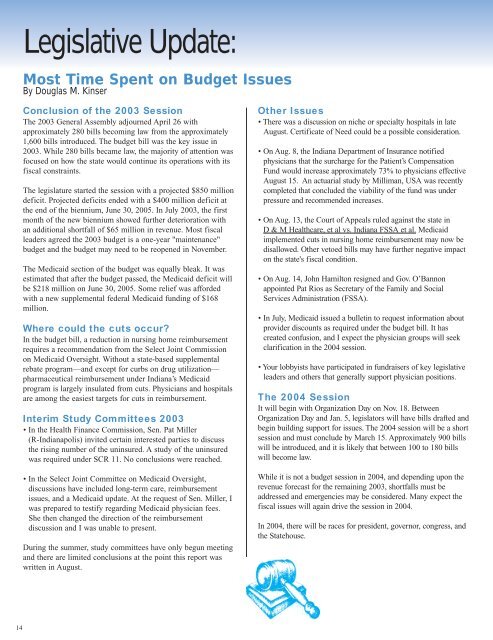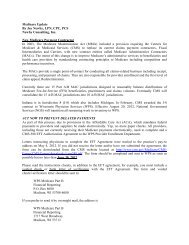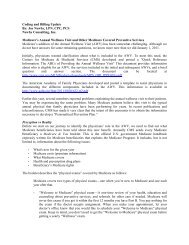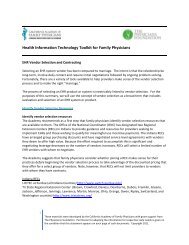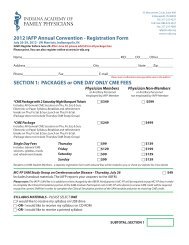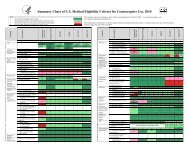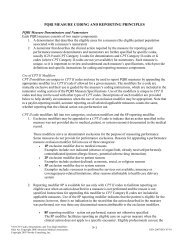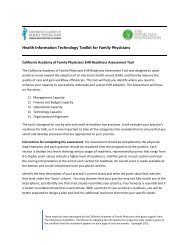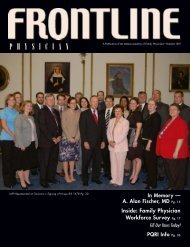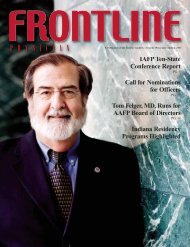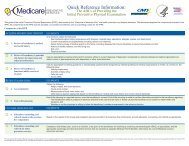Fall - Indiana Academy of Family Physicians
Fall - Indiana Academy of Family Physicians
Fall - Indiana Academy of Family Physicians
You also want an ePaper? Increase the reach of your titles
YUMPU automatically turns print PDFs into web optimized ePapers that Google loves.
Legislative Update:<br />
Most Time Spent on Budget Issues<br />
By Douglas M. Kinser<br />
Conclusion <strong>of</strong> the 2003 Session<br />
The 2003 General Assembly adjourned April 26 with<br />
approximately 280 bills becoming law from the approximately<br />
1,600 bills introduced. The budget bill was the key issue in<br />
2003. While 280 bills became law, the majority <strong>of</strong> attention was<br />
focused on how the state would continue its operations with its<br />
fiscal constraints.<br />
The legislature started the session with a projected $850 million<br />
deficit. Projected deficits ended with a $400 million deficit at<br />
the end <strong>of</strong> the biennium, June 30, 2005. In July 2003, the first<br />
month <strong>of</strong> the new biennium showed further deterioration with<br />
an additional shortfall <strong>of</strong> $65 million in revenue. Most fiscal<br />
leaders agreed the 2003 budget is a one-year "maintenance"<br />
budget and the budget may need to be reopened in November.<br />
The Medicaid section <strong>of</strong> the budget was equally bleak. It was<br />
estimated that after the budget passed, the Medicaid deficit will<br />
be $218 million on June 30, 2005. Some relief was afforded<br />
with a new supplemental federal Medicaid funding <strong>of</strong> $168<br />
million.<br />
Where could the cuts occur?<br />
In the budget bill, a reduction in nursing home reimbursement<br />
requires a recommendation from the Select Joint Commission<br />
on Medicaid Oversight. Without a state-based supplemental<br />
rebate program—and except for curbs on drug utilization—<br />
pharmaceutical reimbursement under <strong>Indiana</strong>’s Medicaid<br />
program is largely insulated from cuts. <strong>Physicians</strong> and hospitals<br />
are among the easiest targets for cuts in reimbursement.<br />
Interim Study Committees 2003<br />
• In the Health Finance Commission, Sen. Pat Miller<br />
(R-<strong>Indiana</strong>polis) invited certain interested parties to discuss<br />
the rising number <strong>of</strong> the uninsured. A study <strong>of</strong> the uninsured<br />
was required under SCR 11. No conclusions were reached.<br />
• In the Select Joint Committee on Medicaid Oversight,<br />
discussions have included long-term care, reimbursement<br />
issues, and a Medicaid update. At the request <strong>of</strong> Sen. Miller, I<br />
was prepared to testify regarding Medicaid physician fees.<br />
She then changed the direction <strong>of</strong> the reimbursement<br />
discussion and I was unable to present.<br />
During the summer, study committees have only begun meeting<br />
and there are limited conclusions at the point this report was<br />
written in August.<br />
Other Issues<br />
• There was a discussion on niche or specialty hospitals in late<br />
August. Certificate <strong>of</strong> Need could be a possible consideration.<br />
• On Aug. 8, the <strong>Indiana</strong> Department <strong>of</strong> Insurance notified<br />
physicians that the surcharge for the Patient’s Compensation<br />
Fund would increase approximately 73% to physicians effective<br />
August 15. An actuarial study by Milliman, USA was recently<br />
completed that concluded the viability <strong>of</strong> the fund was under<br />
pressure and recommended increases.<br />
• On Aug. 13, the Court <strong>of</strong> Appeals ruled against the state in<br />
D & M Healthcare, et al vs. <strong>Indiana</strong> FSSA et al. Medicaid<br />
implemented cuts in nursing home reimbursement may now be<br />
disallowed. Other vetoed bills may have further negative impact<br />
on the state's fiscal condition.<br />
• On Aug. 14, John Hamilton resigned and Gov. O’Bannon<br />
appointed Pat Rios as Secretary <strong>of</strong> the <strong>Family</strong> and Social<br />
Services Administration (FSSA).<br />
• In July, Medicaid issued a bulletin to request information about<br />
provider discounts as required under the budget bill. It has<br />
created confusion, and I expect the physician groups will seek<br />
clarification in the 2004 session.<br />
• Your lobbyists have participated in fundraisers <strong>of</strong> key legislative<br />
leaders and others that generally support physician positions.<br />
The 2004 Session<br />
It will begin with Organization Day on Nov. 18. Between<br />
Organization Day and Jan. 5, legislators will have bills drafted and<br />
begin building support for issues. The 2004 session will be a short<br />
session and must conclude by March 15. Approximately 900 bills<br />
will be introduced, and it is likely that between 100 to 180 bills<br />
will become law.<br />
While it is not a budget session in 2004, and depending upon the<br />
revenue forecast for the remaining 2003, shortfalls must be<br />
addressed and emergencies may be considered. Many expect the<br />
fiscal issues will again drive the session in 2004.<br />
In 2004, there will be races for president, governor, congress, and<br />
the Statehouse.<br />
14


